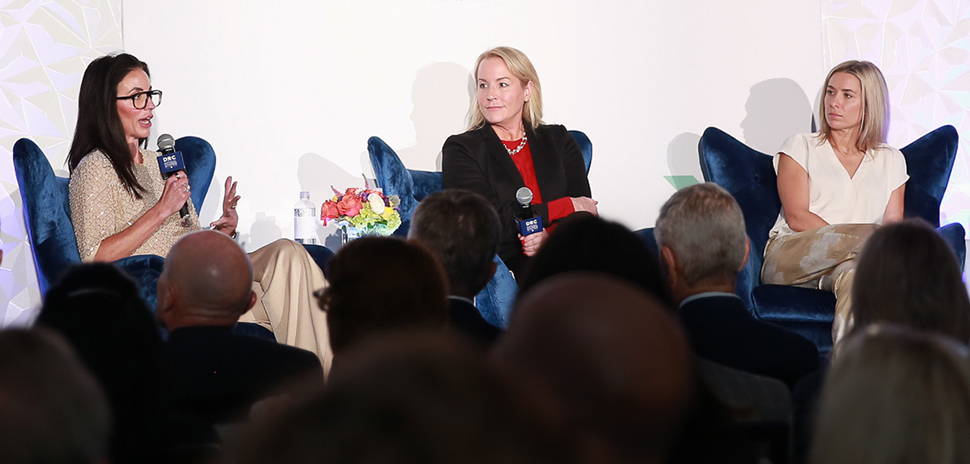Hiring and other business metrics in Dallas-Fort Worth continue bucking national trends, helping make the region an economic “powerhouse” underscored by the budding Y’all Street phenomenom.
That was the word from speakers at the Dallas Regional Chamber’s Tomorrow Summit, held Tuesday, Sept. 9, at the Hall Park Hotel in Frisco. The DRC’s first-ever gathering of its kind—presented by Hillwood and PNC Bank—was focused on ensuring DFW’s future prosperity, according to Dale Petroskey, the chamber’s president and CEO.
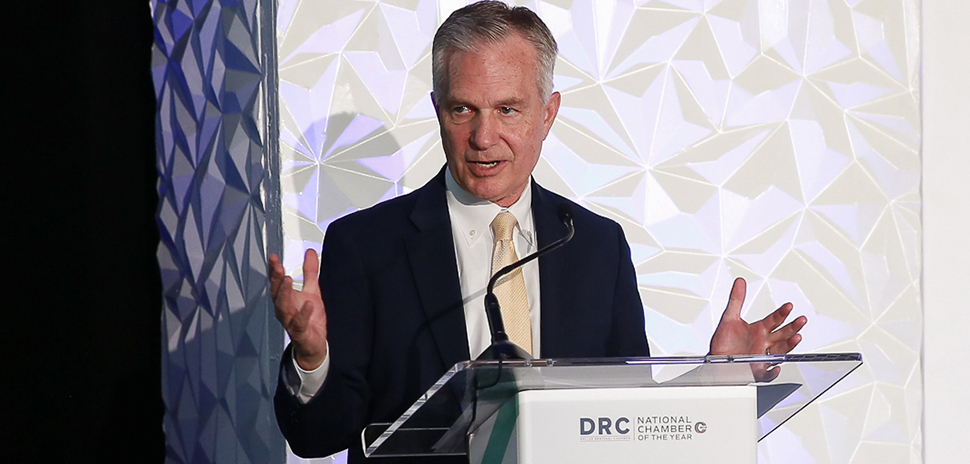
Dale Petrosky [Photo: DRC]
“The Dallas region has become a global powerhouse with seemingly endless possibilities from an economic standpoint. There’s no place any of us would rather be,” Petroskey told the event’s 200-plus attendees. “More than 300 companies have moved to this region in the last 15 years, 1.5 million new jobs have been created here, and it’s not slowing down. This is the most dynamic business market in America, by far. That’s exciting, but it also comes with a responsibility to work together to help make this region even better tomorrow than it is today.”
DFW’s exceptionalism was stressed during a kick-off presentation by Karin Kimbrough, Ph.D., chief economist at professional social network LinkedIn. The site has more than a billion users and proprietary data on 500 occupations and 41,000 different job skills.
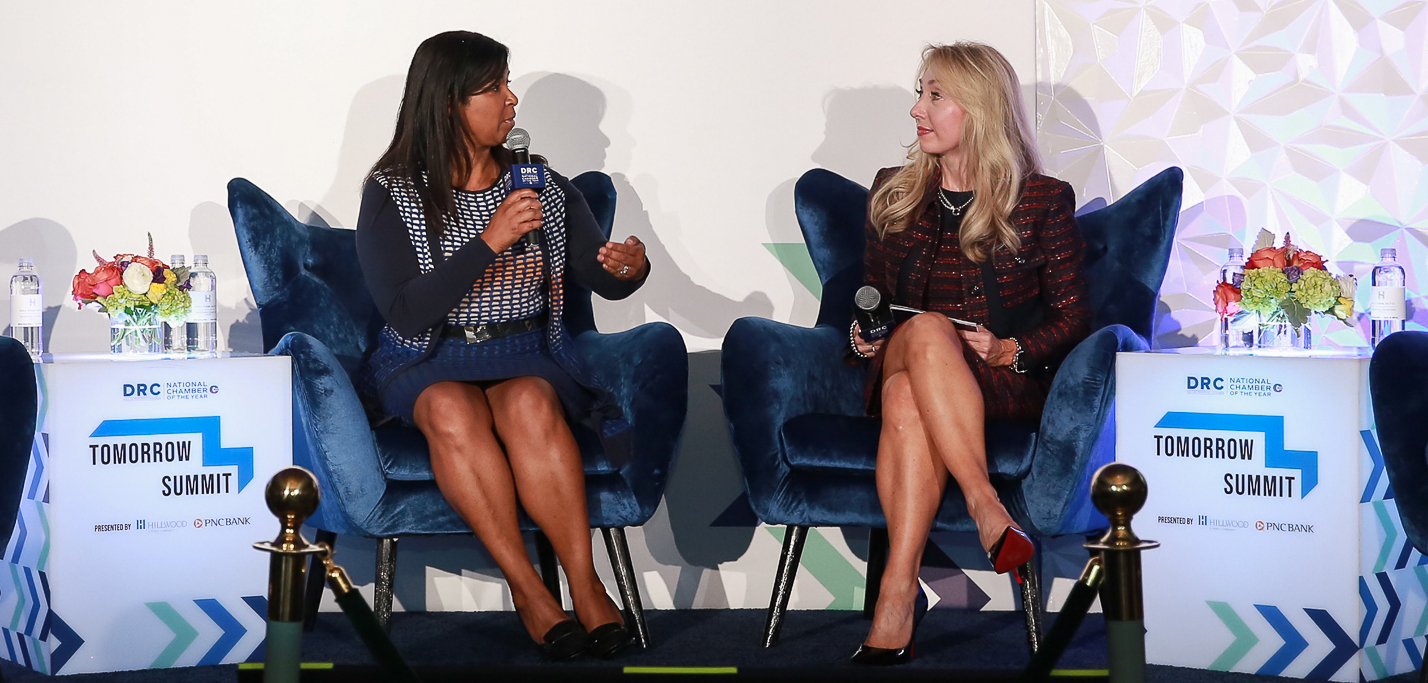
LinkedIn Chief Economist Karin Kimbrough, Ph.D. (left), discusses national hiring trends and Dallas-Fort Worth’s economic resilience with Nichole Jordan, regional managing principal for Grant Thornton’s Texoma region, at the Dallas Regional Chamber’s Tomorrow Summit. [Photo: DRC]
Kimbrough said that despite a sluggish labor market nationally—and even in other parts of Texas—hiring in Dallas is continuing to grow. “It is, however, starting to slow in Austin, where hiring is down 18% by our measure from a year ago,” she said. “Hiring is down by [about] 4% in Houston. So, Houston is slowing a little bit, Austin is slowing a lot. Dallas is still cruising ahead.”
In contrast, Kimbrough said, the national job market has “done a complete 180” since 2021 and 2022—“if you had a pulse, you could get hired” at that time—and become much tougher. There’s been a 20% increase since then in the number of applicants for every open job, and a 20% decrease in entry-level hiring.
The latter isn’t due to the rise of artificial intelligence, but to the “over-hiring” that occurred in ‘21 and ‘22, which nationally has led to “a little bit of a hiring recession” today, she said. Hiring is 5% slower this year than in the same month last year, and confidence about getting and keeping a job is down—especially for Gen Z applicants.
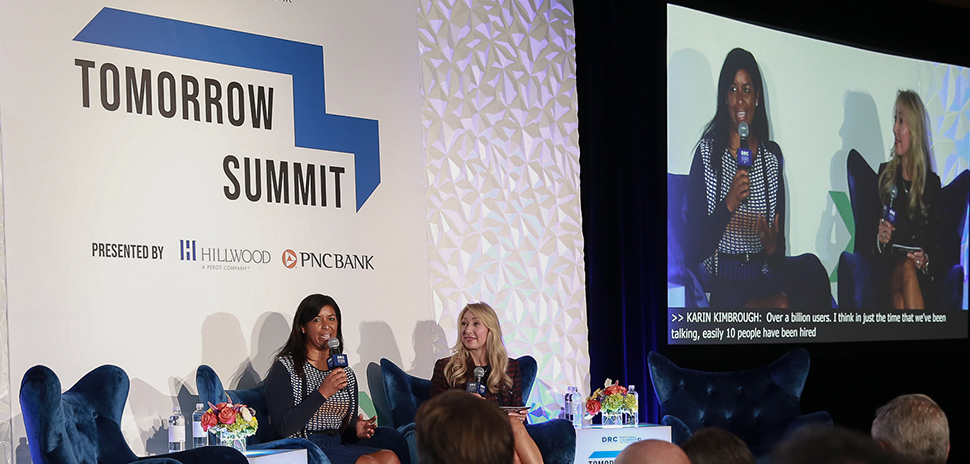
Linkedin Chief Economist Karin Kimbrough, left, said, “Over a billion users. I think in just the time that we ve been talking, easily 10 people have been hired.”
“Employers have been very cautious and choosy about who they want to hire, and they don’t necessarily back-fill open roles when people leave,” Kimbrough said.
At the same time, there’s been a six-fold increase in the number of job postings asking for applicants with AI skills nationally. Becoming AI-literate will be “table stakes” for every job applicant sooner rather than later, added Kimbrough, who called herself a “big believer in the human future of work. I believe jobs are going to be there.”
Even so, AI “is happening. It is here,” she said. “It probably gets overhyped sometimes, but it is absolutely a tool for productivity, and it’s actually a tool for more enjoyment of your work. Because you spend more time doing the things you like to do and less time on the routine, kind of more boring stuff.”
‘What is it about Texas?!’
One industry that’s outpacing most others in adopting AI is finance, which recently has grown its footprint in North Texas so substantially, DFW may be challenging New York as a leading financial hub. In addition to attracting major finance firms like Goldman Sachs, Dallas is home to the upstart Texas Stock Exchange, a national stock exchange that aims to begin trading and host its first listings next year.
Plans for TXSE in DFW gave rise to the area’s playful nickname, Y’all Street—and to countermoves by the two big rival exchanges, Nasdaq and the New York Stock Exchange. Earlier this year, Nasdaq announced it will open a new regional headquarters in Dallas. And the New York Stock Exchange is planning to launch NYSE Texas, reincorporating its NYSE Chicago here.
In a summit panel called “Wall Street to Y’all Street,” representatives from all three exchanges explained Texas’ allure: the chance to connect capital with opportunity in a business-friendly environment—and the number of listed public companies in the Lone Star State. Nasdaq, for example, is home to more than 200 listed Texas companies with nearly $2 trillion in market cap. Texas has the largest number of NYSE listings, representing a market cap of $3.7 trillion.
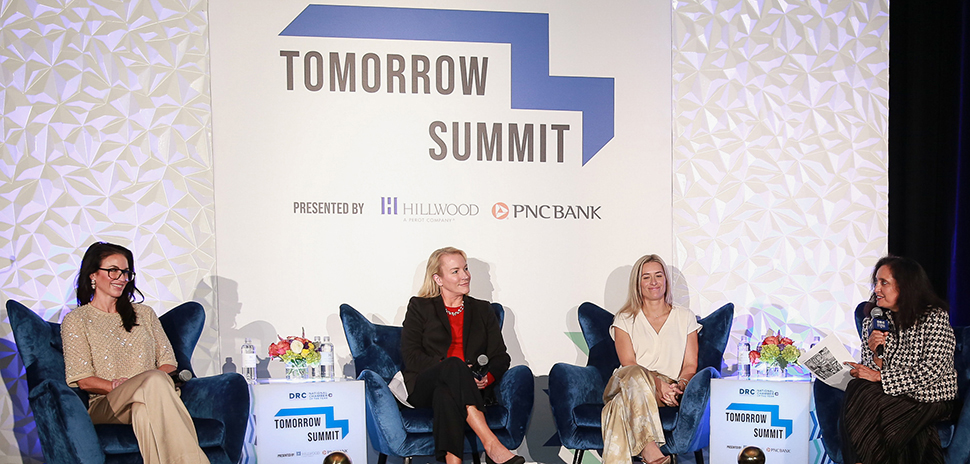
Moderator Sonal Shah, CEO of Texas Tribune (far right), leads discussion with (from left) Texas Stock Exchange’s Nicole Chambers, NYSE’s Liz Hocker, and Nasdaq’s Kate Speight. [Photo: DRC]
The Texas Stock Exchange, meantime, is expecting approval of its registration by the Securities and Exchange Commission “any day now,” said Nicole Chambers, TXSE’s global managing director for listings. “So, everybody keep your fingers crossed here,” she said. “Being a new exchange, the key piece of [approval as a national exchange] is trading. So, we have really focused on staffing up and creating a premier technology team. I think there are seven coders alive that can create a new stock exchange, and we have four of them working for the Texas Stock Exchange.”
Kate Speight, Nasdaq’s senior managing director for capital markets, pointed out that Nasdaq recently filed with the SEC to create a structured regulatory opportunity to trade tokens tied to equity securities. “One thing I think is extremely exciting to look forward to is, how are we going to bring new pools of capital, new pools of liquidity, to the state—whether it be through indexing, through tokenization,” Speight said.
The NYSE’s regional head for capital markets, Liz Hocker, said the new Texas venture by her exchange had been met with open arms. “I’ve lived in Austin since 2000, and there’s been a tremendous response to it,” she said. “We get calls every day, not just from issuers around the state, but also across the country and globally. I was in London a few months ago for South by Southwest London, and we actually got a tremendous number of people coming up to me, saying, ‘What is it about Texas?!’
“So, what I found is that there has been a big appetite for more support, more focus—for us to show that we’re leaning in and providing great tools, resources, and advocacy for issuers every day.”
Near the end of their presentation, the panelists were asked what’s needed to make Dallas a true “global financial center” alongside New York and London by 2035.
Texas will have to maintain its pro-growth, pro-business mindset, they agreed. It will need to keep up with its water, energy, and housing needs, and bring new pools of liquidity to the state. It also will have to continue innovating technologically, balancing its industry mix, and attracting key decision-makers.
“I think with all of that combined, it won’t surprise me that we’re doing a Davos in Dallas,” Chambers said. “You know, I think that might be the next thing.”
New alliances for DEA
Supporting the next generation of that economic growth, Chris Gannett, president of the Dallas-based DOC Cares nonprofit, outlined the group’s flagship education initiative, the DRC-backed Dreams Experience Academy, to business leaders in the audience.
The initiative is the brainchild of Dallas resident and hip-hop legend Tracy “The D.O.C.” Curry, who was in the summit audience.
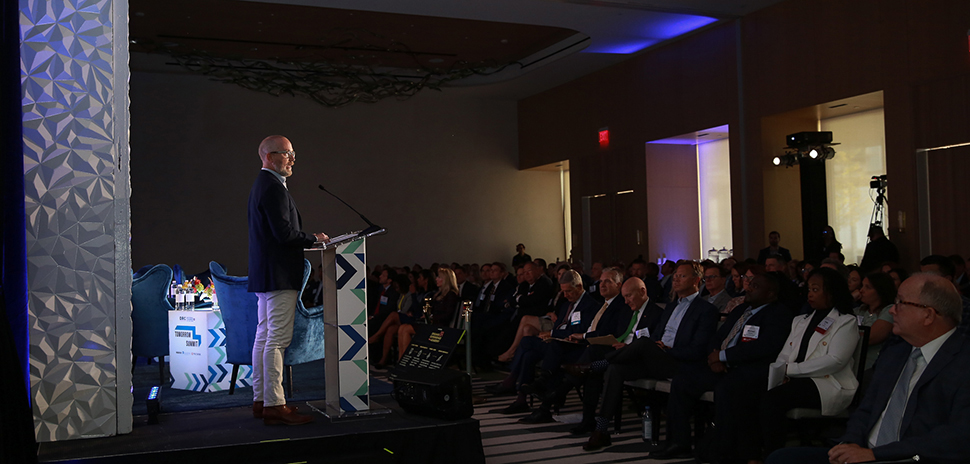
Chris Gannett, president of Dallas-based DOC Cares nonprofit, presents the Dreams Experience Academy education initiative to business leaders and investors at the Dallas Regional Chamber’s Tomorrow Summit. [Photo: DRC]
The DEA, Gannett said, is aimed at giving seventh through 12th grade students in under-championed communities free access to creative and entrepreneurial training in areas such as gaming, music, media, advertising, and technology.
He announced that the initiative, which needs to raise $6 million over five years to become self-sustaining, has just forged public alliances with leadership and faculty of Howard University and New York University’s Tisch School of the Arts, which boasts “the country’s No. 1-ranked game design undergraduate program.”

Chris Gannett displays performance metrics from the Dreams Experience Academy pilot program, showing student engagement and success rates in creative and entrepreneurial training for middle and high school students. [Photo: DRC]
In addition, the summit program included presentation of the chamber’s Building Tomorrow Together awards, which honor companies that recently moved to DFW or are expanding here.
This year’s winners were John Paul Mitchell Systems in Wilmer and Dallas’ Koya Medical.
Don’t miss what’s next. Subscribe to Dallas Innovates.
Track Dallas-Fort Worth’s business and innovation landscape with our curated news in your inbox Tuesday-Thursday.
R E A D N E X T
-

North Texas has plenty to see, hear, and watch. Here are our editors’ picks. Plus, you’ll find more selections to “save the date.”
-
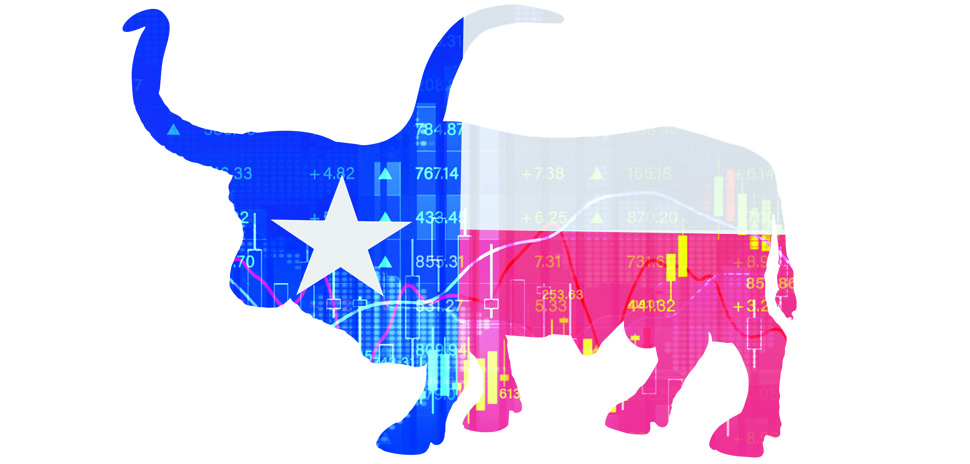
In June, TXSE Group announced plans to launch the Texas Stock Exchange (TXSE), focused on enabling U.S. and global companies to access U.S. equity capital markets via a “fully electronic, national securities exchange.” In the months since, that’s led to endless discussion of the impact of North Texas’ “Y’All Street.” It was capped by yesterday’s announcement that the TXSE had raised over $135 million to date as it named members of TXSE’s board—including former Texas Governor and former U.S. Energy Secretary Rick Perry; former SEC Commissioner Rick Roberts; and Alex Bussandri, the global head of strategy at Citadel Securities.
-
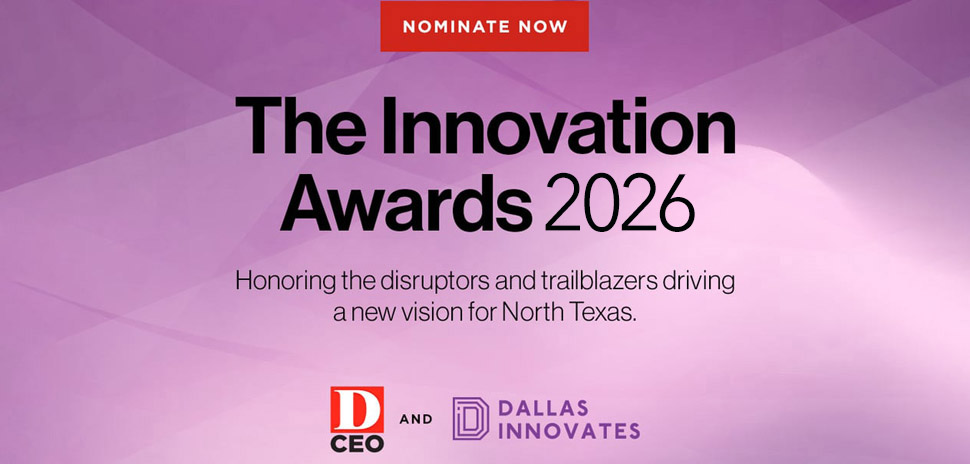
D CEO and Dallas Innovates have expanded The Innovation Awards 2026 with more individual and company categories this year. Now is your chance to be part of the region’s defining recognition for innovators.
-

You’ll find deadlines coming up for a new accelerator program; and many more opportunities.
-

Dallas Innovates, in partnership with the Dallas Regional Chamber, once again is recognizing the most innovative leaders in AI in Dallas-Fort Worth. From visionaries and mavericks to transformers and academics, AI 75’s class of 2025 are the AI pacesetters you need to know now.
